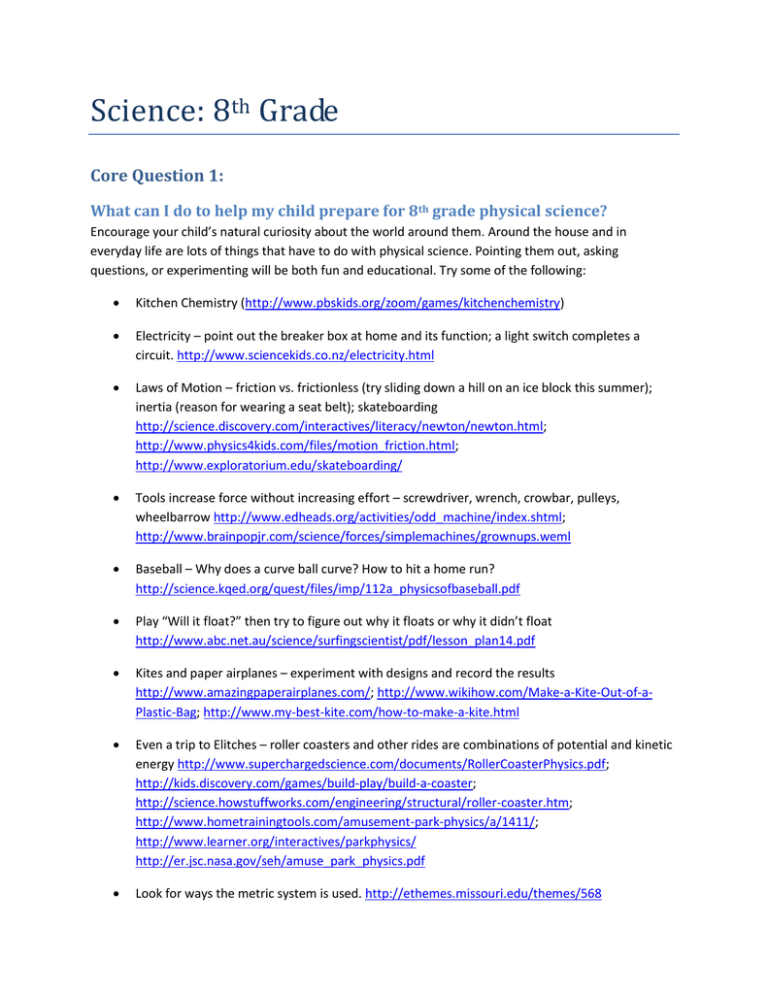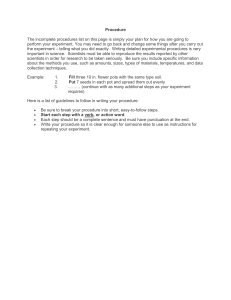8th Science - Denver Public Schools
advertisement

Science: 8th Grade Core Question 1: What can I do to help my child prepare for 8th grade physical science? Encourage your child’s natural curiosity about the world around them. Around the house and in everyday life are lots of things that have to do with physical science. Pointing them out, asking questions, or experimenting will be both fun and educational. Try some of the following: Kitchen Chemistry (http://www.pbskids.org/zoom/games/kitchenchemistry) Electricity – point out the breaker box at home and its function; a light switch completes a circuit. http://www.sciencekids.co.nz/electricity.html Laws of Motion – friction vs. frictionless (try sliding down a hill on an ice block this summer); inertia (reason for wearing a seat belt); skateboarding http://science.discovery.com/interactives/literacy/newton/newton.html; http://www.physics4kids.com/files/motion_friction.html; http://www.exploratorium.edu/skateboarding/ Tools increase force without increasing effort – screwdriver, wrench, crowbar, pulleys, wheelbarrow http://www.edheads.org/activities/odd_machine/index.shtml; http://www.brainpopjr.com/science/forces/simplemachines/grownups.weml Baseball – Why does a curve ball curve? How to hit a home run? http://science.kqed.org/quest/files/imp/112a_physicsofbaseball.pdf Play “Will it float?” then try to figure out why it floats or why it didn’t float http://www.abc.net.au/science/surfingscientist/pdf/lesson_plan14.pdf Kites and paper airplanes – experiment with designs and record the results http://www.amazingpaperairplanes.com/; http://www.wikihow.com/Make-a-Kite-Out-of-aPlastic-Bag; http://www.my-best-kite.com/how-to-make-a-kite.html Even a trip to Elitches – roller coasters and other rides are combinations of potential and kinetic energy http://www.superchargedscience.com/documents/RollerCoasterPhysics.pdf; http://kids.discovery.com/games/build-play/build-a-coaster; http://science.howstuffworks.com/engineering/structural/roller-coaster.htm; http://www.hometrainingtools.com/amusement-park-physics/a/1411/; http://www.learner.org/interactives/parkphysics/ http://er.jsc.nasa.gov/seh/amuse_park_physics.pdf Look for ways the metric system is used. http://ethemes.missouri.edu/themes/568 Find average speed by dividing distance by time whether it’s a walk to the park, a bike ride, a car trip, or traveling by plane Watch Mythbusters on the Discovery Channel http://dsc.discovery.com/fansites/mythbusters/games/central.html Look for ideas for a science fair project (online search for: Science Fair Projects) Visit the National Renewable Energy Laboratory in Golden http://www.nrel.gov/; Note: Denver Public Schools provides these websites as a suggestion for additional content and does not assume responsibility for the quality or content provided. Core Question 2: What will my child learn throughout the year during 8th grade physical science? Scientists believe that all events can be explained in terms of interactions between objects. Scientists study interactions through observations and experimentation to determine properties of objects and the nature of interactions. Scientists can describe, analyze, and explain interactions by considering the energy transferred between objects. Despite changes that often occur during interactions, some things remain the same. During interactions in closed systems, total mass and energy stay the same. Scientists classify materials by their characteristic properties and interactions. When two materials interact and a new material is formed, it is called a chemical interaction; otherwise, it is a physical interaction. Scientists use models to help them think about things at scales too small or large to observe directly or with tools that extend the senses. The Small Particle Theory is a powerful model for thinking about matter and how it interacts with other matter. Scientists use the Small Particle Theory to understand what is happening to the mass and energy of chemical systems during chemical reactions. Scientists can describe, analyze, and explain interactions by considering forces between objects, such as gravitational forces between Earth and other objects. Inquiry involves engaging in scientifically oriented questions, giving priority to evidence in responding to questions, formulating explanations based on evidence, connecting explanations to scientific knowledge, and communicating and justifying explanations. The development of scientific knowledge is based on questioning current knowledge, using empirical facts to develop logical theories, and verifying observations and claims. Core Question 3: How do I monitor my child’s progress and learning throughout the year? What resources can I use in order to do this? Check your child’s science notebook. Is it organized? Does it appear to be complete? (i.e.: question, hypothesis/prediction, data usually recorded in a table, conclusion) Do you understand what is in it? Are statements clear? Are conclusions backed up with the evidence (data) collected? Talk with your child about the notebook. Ask him/her to tell you about the experiment. Ask him/her to explain what was learned. Ask the teacher for vocabulary lists. Make study cards with the word on one side and its definition, picture, and/or use in context on the other side. Your child will be more inclined to use them if you also participate. You can play a classic matching game by making another set of cards with the vocabulary word on one card and its definition on another card. Mix/shuffle the cards, place them print side down on a flat surface, take turns flipping pairs of cards over trying to make matches. For games, visit the student section of the text’s website http://cpucips.sdsu.edu/interactionsinfo/ Volunteer to assist in the classroom with experiments or in the afternoons with lab preparations and/or clean-up. Do you or someone you know have expertise in any of the specific subjects being studied (like electricity, chemistry, investigating traffic accidents, etc.)? Volunteer to present a real-world application to the classroom. Projects: check your child’s “planner/agenda” regularly to keep from being surprised by a due date at the last-minute; assist your child in developing a plan to complete the project on time; use materials that are free or inexpensive and easily accessible; and show interest in the project but try to avoid becoming so involved that you end-up doing it. If a presentation is required, ask your child to practice giving their presentation to you. Some science websites are: http://www.brainpop.com/; http://familyinternet.about.com/od/websitesforkids/tp/science_websites.htm; http://www.edheads.org/; http://science.discovery.com/; http://www.exploratorium.edu/; http://www.physics4kids.com/

